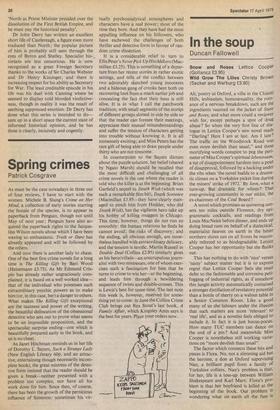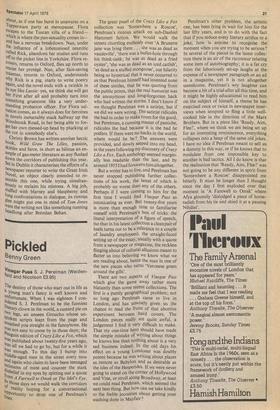In the soup
Duncan Fallowell Snow and Roses Lettice Cooper (Gollancz £3.95) Wild Grow The Lilies Christy Brown (Seeker and Warburg £3.90) Ah, poetry at Oxford, a villa in the Chianti Hills, lesbianism, homosexuality, the romance of a nervous breakdown, such are the ingredients vaunted on the jacket of Snow ,and Roses, and what more could a reviewer wish for, except perhaps a spot of drug abuse? So when the very first line of dialogue in Lettice Cooper's new novel reads "Darling! Here I am at last. Am I late? The traffic on the Woodstock Road was even more devilish than usual," and these mortifying words conspire to peg the perimeter of Miss Cooper's spiritual lebensraum, a tut of disappointment hardens into a pout of disapproval, followed by a hacking under the ribs when 'the novel builds to a dramatic climax on a Yorkshire picket line during the miners' strike of 1972.' By Jove, what a turn-up. But dramatic for whom? That ever-growing community in our midst, the ex-chairmen of the Coal Board?
A novel which promises us quivering sunsets ten miles outside Florence, dry epigrammatic cocktails, and readings from Louis MacNeice before dinner, and ends UP doing bread runs on behalf of a dialectical, materialist heaven on earth in the bitter northern shires can on all fronts be reasonably referred to as biodegradable. Lettice Cooper has her opportunity but she flunks out.
This has nothing to do with 'nice' versus `nasty' subject matter but it is to express regret that Lettice Cooper feels she must defer to the fashionable and corrosive petifogging of industrial rights, as if somehow this jungle activity automatically contained a stronger distillation of revelatory potential than a bottle of sherry on a walnut table in a Senior Common Room. Like a good many of us she labours under the illusion that such matters are more 'relevant' to 'real life', and as a novelist feels obliged to include it. In fact it is just hocus-pocus. How many TUC members can dance on the end of a pin ? And meanwhile Miss Cooper is nonetheless still working variations on "more devilish than usual".
The factor which connects these bits and pieces is Flora. No, not a slimming aid but the heroine, a don at Oxford supervising Nan, a brilliant pupil from a family of Yorkshire colliers. Nan's problem is that, for her, life is a toss-up between William Shakespeare and Karl Marx. Flora's problem is that her boyfriend is killed at the beginning of the book. Our problem is wondering what on earth all the fuss is
about, as if one has burst in unawares on a Tupperware party at menopause. Flora escapes to the Tuscan villa of a friend— which is where the pan-sexuality comes in— and has a nervous breakdown. Nan, under the influence of a lobotomised neurotic called Rick, abandons her studies and runs off to the picket line in Yorkshire. Flora recovers, returns to Oxford, flies up north to rescue her protégé. Nan, after face-saving traumas, returns to Oxford, understands Why Rick is a pig, starts to write poetry again, and the novel ends with a twinkle in its eye like Lassie: yes, we think she will get her First after all and probably turn into something gruesome like a very understanding probation officer. For Flora salvation comes, as it always does for heroines ln novels ineluctably stuck halfway up the Woodstock Road, in her being able to forget her own messed-up head by plucking at the rot in somebody else's. Christy Brown has written another hectic hook, Wild Grow The Lilies, passion, Skittles and farce, in short as bilious an exarriPle of gas-meter literature as any flushed down the corridors of publishing this year. Set in Dublin it characterises the efforts of a newspaper reporter to write the Great Irish Novel, an object clearly intended to resemble this one, while trying simultaneously to reclaim his mistress. A big job, stuffed with blarney and blasphemy and lOng confrontations in dialogue, its riotous glee might put one in mind of Tom Jones Were the writing not like something running headlong after Brendan Behan.



































 Previous page
Previous page